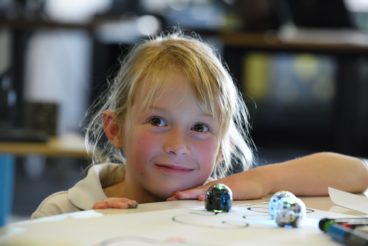While GT children may find some areas of academics easier than many of their peers, they may not be gifted and/or talented in everything. High achievement, just as is true for adults, isn’t global – there are areas these children excel in, and some where they may struggle. Along with Gifted and Talented, there are Twice-Exceptional (2e) kids. Twice-exceptional kids can be gifted in one area, but may have identified (or even unidentified) learning or other disabilities. Excelling in one or more areas of school, but then struggling to do well in others (even if they are getting descent grades) can create tremendous amounts of stress, anxiety, and feelings of isolation. It’s important to recognize these and offer support.
Stress and Anxiety in Gifted and Talented Children
GT and 2e children are often recognized and praised for their achievements and can become attached to that identity. Fear of failure can then become an obstacle that holds them back from trying new things, especially those outside of their area of talent. They become risk avoidant, shying away from activities where they don’t think they can have the same high levels of success.
Stress creeps in as children become fearful of new experiences. If they do try, and struggle, rather than seeing it as learning, they become perfectionists and beat themselves up over the performance they judge as subpar. This perfectionism can paralyze the student and damage their self-esteem, as it has become part of their identity. Everyone makes mistakes, yet the gifted child will see themselves as a failure.
Lack of resilience, tenacity, and unprocessed, confusing feelings may mean the child will likely face more stress when facing challenges in the future. Sometimes this stress and anxiety shows up in interpersonal relationships, further causing the student to become relationship avoidant and having a negative impact on their self-esteem.
Isolation and Interpersonal Skills
Because GT and 2e children have complex thinking skills, their ability to communicate with others can be difficult. They may feel isolated because they are ‘different’. It’s important to help your child/student communicate – and this may mean encouraging writing and/or artistic or other forms of expression. It’s also important to help them understand the value everyone has for just being human. Because their self-worth is tied up in performance, it’s critical to encourage them to see themselves, and others, as important whether or not they achieve a goal or high level of performance. Encourage and create a safe and supportive space for GT youth to speak and engage with peers.
The Imagine Project
One of the ways GT and 2e youth can learn to express themselves and connect more with their peers is through the Imagine Project. This 7-step writing process can be used individually, in a group, or as part of a classroom curriculum. It supports emotional expression, social balance, and empathy. It fosters increased compassion, and offers healing and hope to children experiencing stress and trauma.
When the students write, and are given the opportunity to share their Imagine stories, they build relationships, reduce the emotional intensity of their pains and stress, and feel heard. They often demonstrate more kindness and build new friendships, while also learning a tool for resilience and expression – so important to all kids, but especially the Gifted and Talented and Twice-Exceptional groups.
The Imagine Project is free and a simple way to introduce (or grow) a youth’s ability to write, self-express emotions, listen and show support and empathy towards others. If they are struggling with pain or trauma, the experience also allows them to move through the hurt and regain hope. The Imagine Project is currently being used by families, teachers, and counselors across the United States and internationally. Go to The Imagine Project and download your free journal now. Do the writing process as a classroom, group, with a family, or individually. GT and 2e kids love it!! So will you!
Thank you!
Dianne
The Imagine Project, Inc., a nonprofit organization that helps kids, teens, and adults overcome challenging life circumstances through expressive writing. Dianne is a thought leader in the area of stress and trauma in children. Her simple, yet profound 7-step writing tool, now used by schools across the US, gives kids and teens the opportunity to rewrite a challenging personal story and Imagine new possibilities in its place.


